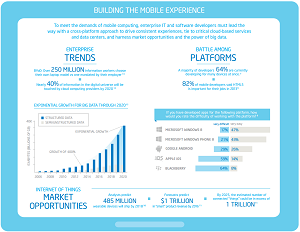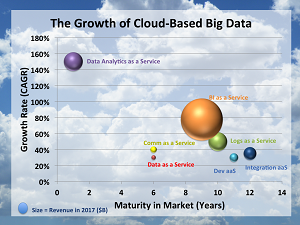Mobile, Big Data Development Moves to the Cloud
While not a new trend, the migration of mobile and Big Data development to the cloud has shifted into overdrive lately.
Witness a new report from ABI Research predicting that the growth in cloud application development and management platforms will drive $3.6 billion in mobile enterprise application revenues by 2019.
The research firm said more companies are looking to mobile application platforms -- deployed either on-premises or in the cloud -- for the development and management of their enterprise apps. Cloud-based solutions, however, are expected to outpace their on-premises counterparts, to the tune of 42.5 percent compound annual growth rate (CAGR) from this year to 2019.
"Mobile applications allow for greater flexibility when mobilizing content and employees," said ABI Research senior analyst Jason McNicol. "However, the cost in terms of time and resources is fairly expensive to generate a single app for multiple platforms like iOS, Android and Windows Phone. Fortunately, new cloud-based development solutions have evolved and are now gaining traction to reduce the app development time while permitting cross-platform deployment."
 [Click on image for larger view.] Intel highlights mobile development trends.
[Click on image for larger view.] Intel highlights mobile development trends.
(source: Intel infographic)
These cloud-based development solutions are divided into two camps, the company said: front-facing and back-end integration.
An example of the back-end trend -- or Mobile Backend as a Service (MBaaS), because everything has to be an "X as a Service" these days -- was just revealed yesterday. Amazon Web Services announced a new mobile SDK and associated services to simplify some of the back-end plumbing like identity and data management, hooking up to storage, sending push notifications, analyzing user behavior, and so on. Think Microsoft Azure Mobile Services or the similar Google initiative just announced two weeks ago.
On the front-end, as ABI Research noted, it's pretty much all about cross-platform app development, an exploding market as evidenced from recent tools announced by Oracle, Embarcadero Technologies, Xamarin, AppGyver, Microsoft and many others.
Meanwhile, in the Big Data arena, things are happening fast as the trend to move large-scale analytics to the cloud accelerates.
The advantage of running your Big Data analytics in the cloud rather than on-premises -- especially for smaller companies with constrained resources -- are numerous and well-known. Oracle summed up some of the major business drivers in the article, "Trends in Cloud Computing: Big Data's New Home":
- Cost reduction
- Reduced overhead
- Rapid provisioning/time to market
- Flexibility/scalability
"Cloud computing provides enterprises cost-effective, flexible access to Big Data's enormous magnitudes of information," Oracle stated. "Big Data on the cloud generates vast amounts of on-demand computing resources that comprehend best-practice analytics. Both technologies will continue to evolve and congregate in the future."
In fact, they will evolve and congregate to form a $69 billion private cloud storage market
by 2018, predicted Technology Business Research. That's why the Big Data migration to the cloud is picking up pace recently -- everybody wants a piece of the multi-billion-dollar pie.
As Infochips forecasted early last year: "Cloud will become a large part of Big Data deployment -- established by a new cloud ecosystem."
 [Click on image for larger view.]
Infochips illustrates the Big Data trend.
[Click on image for larger view.]
Infochips illustrates the Big Data trend.
(source: Infochips)
The following moves by industry heavyweights in just the past few weeks show how that ecosystem is shaping up:
-
IBM last week added a new Big Data service, IBM Navigator on Cloud, to its IBM Cloud marketplace. With a reported 2.5 billion gigabytes of data being generated every day, IBM said the new Big Data service will help organizations more easily secure, access and manage data content from anywhere and on any device.
"Using this new service will allow knowledge workers to do their jobs more effectively and collaboratively by synchronizing and making the content they need available on any browser, desktop and mobile device they use every day, and to apply it in the context of key business processes," the company said.
The new service joined other recent Big Data initiatives by IBM, such as IBM Concert, which offers mobile, cloud-based, Big Data analytics.
-
Google last month announced tools to "help developers build and optimize data pipelines, create mobile applications, and debug, trace, and monitor their cloud applications in production." One such tool added to the company's Cloud Platform suite is Cloud Monitoring, designed to "let developers understand, diagnose and improve systems in production."
Another is Google Cloud Dataflow, "a fully managed service for creating data pipelines that ingest, transform and analyze data in both batch and streaming modes."
Dataflow is a successor to MapReduce, a programming paradigm and associated implementation created by Google that was a core component of the original Hadoop ecosystem that was limited to batch processing and came under increasing criticism as Big Data tools became more sophisticated.
"Cloud Dataflow makes it easy for you to get actionable insights from your data while lowering operational costs without the hassles of deploying, maintaining or scaling infrastructure," Google said. "You can use Cloud Dataflow for use cases like ETL, batch data processing and streaming analytics, and it will automatically optimize, deploy and manage the code and resources required."
EMC on Tuesday acquired TwinStrata, a Big Data cloud storage company. The acquisition gives traditional storage vendor EMC access to TwinStrata's CloudArray cloud-integrated storage technology.
That was just one of a recent spate of moves to help EMC remain competitive in the new world of cloud-based Big Data. For example, when the company announced an upgrade of its VMAX suite of data storage products for big companies, The Wall Street Journal reported: "Facing Pressure from Cloud, EMC Turns Data Storage into Service."
The same day, EMC announced "a major upgrade to EMC Isilon OneFS, new Isilon platforms and new solutions that reinforce the industry's first enterprise-grade, scale-out Data Lake." But wait, there's more: EMC also yesterday revealed "significant new product releases across its Flash, enterprise storage and Scale-Out NAS portfolios" to help organizations "accelerate their journey to the hybrid cloud."
EMC's plethora of Big Data/cloud announcements make it clear where the company is placing its bets. As financial site Seeking Alpha reported: "EMC Corporation: Big Data and Cloud Computing Are the Future."
That was in March, and the future is now.
Posted by David Ramel on July 11, 2014